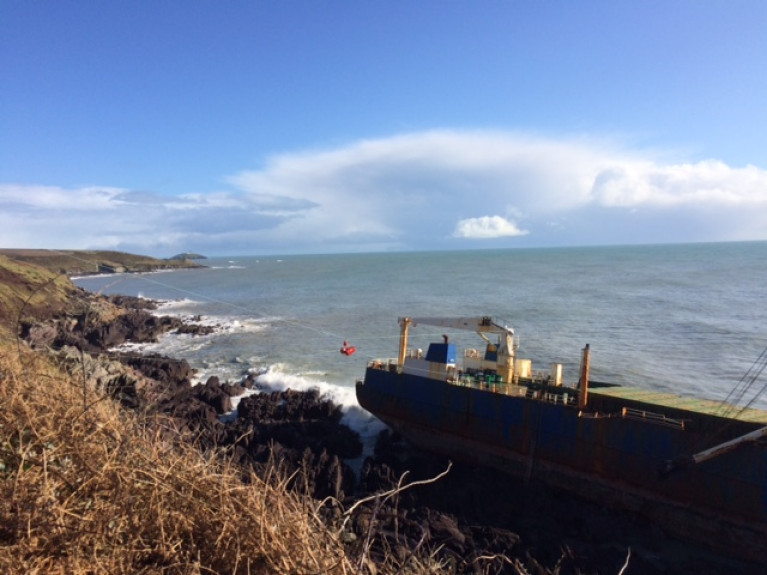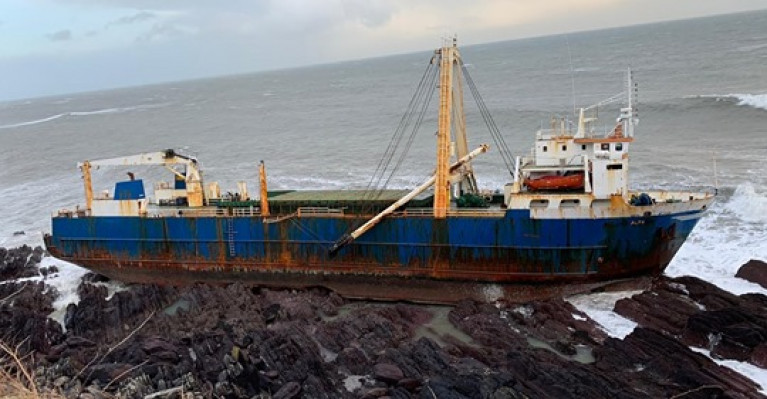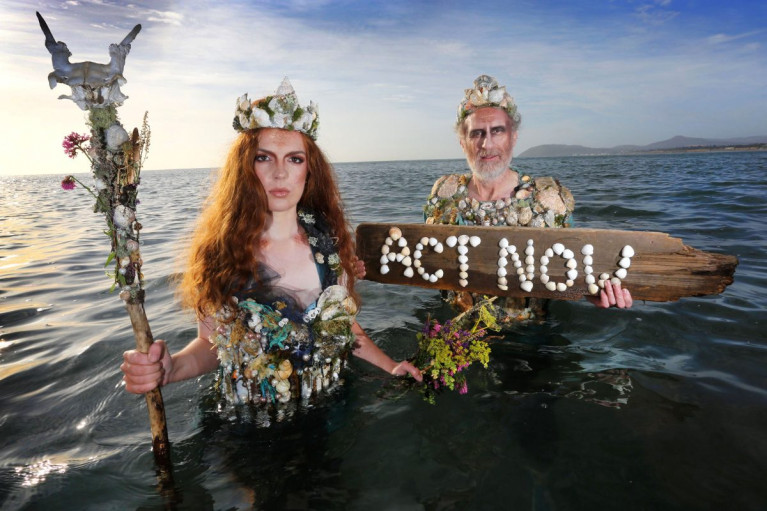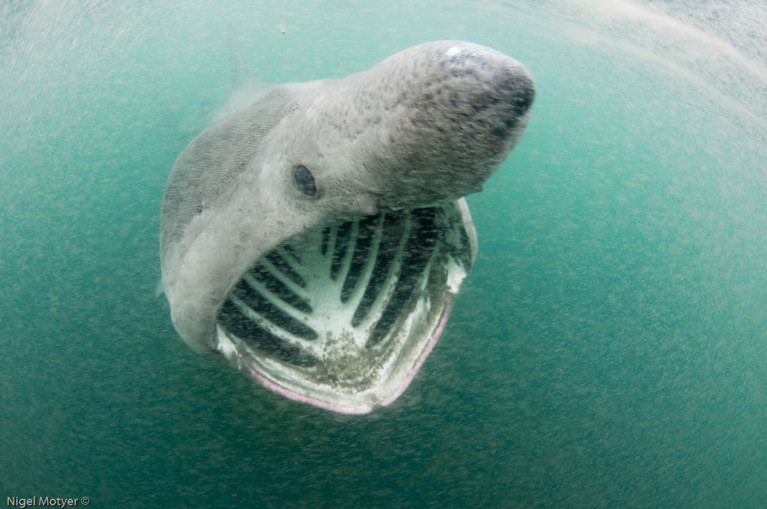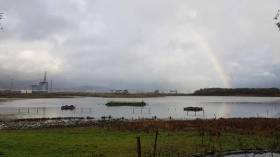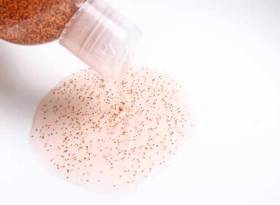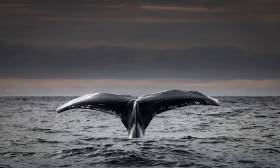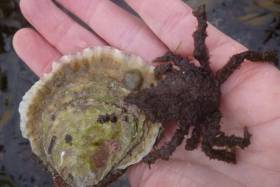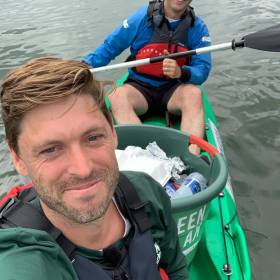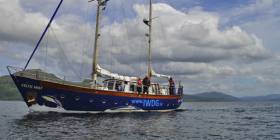Displaying items by tag: marine wildlife
Oil Drums From Grounded Ghost Ship to Be Removed by Cork County Council
Preparing to remove materials from a grounded ghost ship by helicopter on Tuesday is in the hands of Cork County Council as they could pose a pollution risk.
The council according to Green News.ie, is preparing to airlift barrels of machine oil from the abandoned cargo ship (Alta) stranded on rocks near Ballycotton in east Cork as part of its pollution mitigation efforts.
It has said that the coastal operation to reduce the risk of an oil spill from the ghost ship was ongoing during the weekend and that a helicopter is going to be used to facilitate the process.
The 77m long cargoship, MV Alta was abandoned since September 2018 and was drifting across the Atlantic until it was grounded in Ballycotton during Storm Denis. The US Coast Guard had rescued the ship’s 10 crew members from the Atlantic Ocean in 2018.
The Council had previously said that very little diesel was left in the vessel’s fuel tanks and that its environmental scientists are satisfied that there is no visible pollution within the Ballycotton Bay Special Area of Conservation (SAC) or nearby Natural Heritage Areas.
Following further investigation, the local authority discovered barrels of machine oil and diesel stowed in various parts of the MV Alta. A marine contractor has now boarded the ship to bring barrels onto the deck to facilitate their safe removal, according to the Council.
Click HERE for more on this story.
Fuel In Small Amount But No Cargo on Abandoned Ship
Fuel in small amounts has been found in tanks belonging to the grounded cargo ship, MV Alta, but there is no cargo on board.
That is according to an initial report by marine contractors who boarded the vessel at low tide this morning.
It followed a request from Cork County Council and the Irish Coast Guard.
The 80-metre vessel ran aground west of Ballycotton, Co Cork during Storm Dennis on Sunday.
It had been drifting in the Atlantic for more than a year after it was abandoned by its crew.
RTE News has more here to report on the grounding.
Oceans: Warmest Temperature Recorded in 2019
The warmest year for the ocean in all of human history took place last year, according to a new study.
According to GreenNews.ie, research from the Institute of Atmospheric Physics also found that the past five years produced the warmest ocean temperatures on record.
The Atlantic Ocean has absorbed a large amount of heat, while the Southern Ocean that encircles Antarctica has taken up “most of the global warming heat” since 1970, the study finds.
Marine heatwave events were also found in the Mediterranean Sea and continue to pose a significant risk to marine biodiversity and fisheries, the study adds.
For further reading click this link.
Lecture: “Secrets of the Basking Shark-in Search of a Sea-Monster”
The Friends of Glenua 2019/20 Winter Lectures, in aid of the RNLI, resumes on Thursday 16 January at the Poolbeg Yacht & Boat Club, Dublin.
An entry contribution of €5 is in aid of the RNLI and the subject of the lecture is: “Secrets of the Basking Shark-in search of a sea-monster”
The speaker is Emmett Johnston.
The basking shark is the second largest shark in the world, growing to almost 11 metres and weighing up to 4 tonnes. With huge gaping mouth and lethargic surface swimming behaviour, this giant creature is often seen in Irish waters during summer months.
Having a liver yielding up to 400 gallons of valuable oil, basking sharks were slaughtered in their thousands in Ireland for over a 200 years. Now they are little more than a curiosity for fishermen and sailor alike but mysteries abound. Where, for instance, do they go in winter?
In the last decade, Irish marine scientists have pioneered the hunt for solutions with new research methods and unthreatening technologies, such as pop-up electronic tags and satellites. They have uncovered new truths about one of the world’s most elusive creatures, a true oceanic citizen, an animal that carries no passport and respects no boundaries.
Emmett Johnston is an ecologist with the National Parks and Wildlife Service, and a co-founder of the Irish Basking Shark Study Group. Since 2009 he has led the development of basking shark centred research, conservation and community initiatives in Irish and International waters. He is also an active member of the Irish Whale and Dolphin Group.
In his lecture, Emmett will tell the story of Ireland’s long relationship with this iconic marine creature and how recent advances in marines science are helping marine ecologists to gain new insights into how animal behaviour studies can inform the conservation of our natural world.
Belfast Harbour's 'RSPB Window on Wildlife' Gives a Bird's Eye View
As you make your passage west through Belfast Harbour to the Marina you probably don’t realise that on your port side near the cruise liner terminal is gem of a wildlife sanctuary just a hundred metres away writes Betty Armstrong.
And it’s walkable from the Marina via Airport Road.
It’s called Belfast’s Window on Wildlife (Wow), run by the conservation charity RSPB (The Royal Society for the Protection of Birds), and from a huge window in the refurbished visitor centre overlooking a freshwater lagoon, you can see a huge variety of birds and ducks. There are also several Polish Konik ponies which graze the area around the lagoon, creating ideal conditions for ground-nesting birds.
"Over 200 different species have been recorded"
Over 200 different species have been recorded long with lots of butterflies, mammals, fish and plants. Binoculars are available though the birds and ducks are so close they’re hardly needed.
This time of year brings mostly ducks from the Arctic regions and Eastern Europe - wigeons, teals, shovelers and shelducks. And WOW will also sometimes even get shorebirds visiting from Siberia and North America.
From the Belfast Harbour Marina in Titanic Quarter it’s about a 45-minute walk but it’s also safe to cycle. Bikes can be hired just across the River Lagan by the footbridge.
EU Clears Way for Laws Restricting Microbead Use
The EU has permitted the Irish government to introduce legislation restricting use of plastic microbeads to protect marine wildlife and the environment writes Lorna Siggins.
Minister for Housing, Planning and Local Government Eoghan Murphy confirmed the European Commission’s clearance last night (Wed), and said he hoped the new legislation would be in place as soon as possible.
“While several states legislated to prohibit personal care products containing plastic microbeads Ireland will be the first EU member state to extend such prohibition to detergents, abrasive scouring agents and other cleaning products," he said.
Mr Murphy also announced initiation of an expert group to advise on expanding Ireland’s marine protected areas (MPAs).
He was speaking at An Taisce’s annual Clean Coasts “Love Your Coast” photography awards in The Morrison Hotel, Dublin.
Mr Murphy acknowledged that plastic microbeads “represent only one element of the microplastics in our oceans”.
“However, it is estimated that many billions are being washed down the drain and into the world’s rivers, lakes and seas each year. Once in our rivers and seas, they can last for centuries without breaking down. Aquatic animals may ingest them and they cannot be removed once they are in the marine environment,”he said.
The Microbeads (Prohibition) Bill 2019, which is at committee stage in the Dáil, required EU approval, due to its proposed restriction on the free movement of goods in the European single market.
The legislation will provide for a prohibition of the “manufacture, import, export or sale of products containing intentionally added plastic microbeads, to include “rinse-off” personal care products, detergents, and domestic and industrial abrasive cleaning products and scouring agents”.
Mr Murphy submitted a derogation notification for the Bill to the European Commission on 19th July 2019, along with detailed technical documentation supporting the justification for the restriction on environmental grounds.
The notification carried with it a three month standstill period during which time the legislation could not be enacted in compliance with EU legislation, and that standstill period concluded on October 21st.
The legislation provides that the Environmental Protection Agency is responsible for implementation, Mr Murphy said.
It proposes that a person convicted would receive a Class A fine and/or a prison sentence of up to six months on summary conviction, or a fine of up to €3,000,000 and or a prison sentence of up to five years on indictment.
“While this is an important step, it is only one of many measures we will have to introduce over the coming years to reduce the level of litter and plastic pollution entering our seas and oceans,” Mr Murphy said.
In addition to introducing national legislation, the Government has been “actively supporting the development of measures at EU-level to tackle plastic waste including through the European Strategy for Plastics in a Circular Economy adopted in January 2018”, he said.
Mr Murphy also said he intended to bring forward primary legislation to designate marine protected areas (MPAs) next year, and plans to “significantly expand” Ireland’s network of such protected zones to meet current internationally agreed target of ten per cent.
He said it was central to Ireland’s implementation of the EU Marine Strategy Framework Directive, the OSPAR Convention, and commitments under the UN Sustainable Development Goals and the UN Convention on Biological Diversity”.
He said that he had invited Professor Tasman Crowe, director of the Earth Institute and associate dean of science at University College, Dublin to chair an expert advisory group.
“The other members of the advisory group will be selected from across a range of sectors and will consist of members with appropriate national and international expertise,” Mr Murphy said, and its composition would be “announced shortly”.
“Their work will include reviewing existing protection measures and advising me on the processes required for the creation of MPAs,” Mr Murphy said.
The group “will also consider the gaps in existing legislation to underpin such a network” he said, and he expected the work would take place over a period of six months. The report with recommendations would “feed into the development of this important new legislation”, he said.
MPAs can take a variety of forms ranging from exclusive marine reserves to areas allowing sustainable use and restricting specific activities, Mr Murphy’s department said.
“Ireland's future network may include the incorporation of existing marine Special Protection Areas (SPAs) and Special Areas of Conservation (SACs) under the Birds or Habitats Directives. It may also incorporate protection measures established under the Common Fisheries Programme (CFP) and other conservation and protection measures,”it said.
“MPAs can also play a role in mitigating the effects of climate change and ocean acidification by ensuring that the marine ecosystems are healthy and resilient and by safeguarding the marine environment’s current role as a natural storage of carbon,” it said.
Ireland, through the EU, is a party to the UN Convention on Biological Diversity (CBD).
It has agreed that “by 2020, at least 17 per cent of terrestrial and inland water areas and 10 per cent of coastal and marine areas, especially areas of particular importance for biodiversity and ecosystem services, are conserved through effectively and equitably managed, ecologically representative and well-connected systems of protected areas and other effective area-based conservation measures, and integrated into the wider landscape and seascape”.
Stories from the Deep: Reflections on a Life Exploring Ireland’s North Atlantic Waters
Ken O’Sullivan spent the summers of his youth in what he describes as a ‘Huckleberry Finn-type existence’ on Fenit Island, Co Kerry, his father’s home place and that of his family since 1750. Getting the fishing bug at aged 10, his days were passed pulling nets out of freezing pre-dawn waters, and picking periwinkles and carrageen he’d sell in Tralee. Hard work, but it brought a great sense of purpose, of harvest and subsistence and self-dependence.
Little did he know, these were experiences and lessons that would stand to him when he chose a difficult but rewarding career route as a film-maker producing documentaries about the sea. This resulted in three ocean wildlife TV series including the critically acclaimed RTÉ TV series, ‘Ireland’s Deep Atlantic’, broadcast in 2018 and now a part to the Junior Cert curriculum.
Stories from the Deep is Ken’s lyrical potted memoir of a life-sustaining connection with the sea. Emigrating from recession Ireland to New York in the 1980s, O’Sullivan drove a truck, moved furniture and swept streets whilst trying to ‘make it’ in a rock band, before moving to London to work in computing on financial trading floors – but every sweltering summer Sunday was always spent craving for the sea at Lahinch, near his home place in Clare.
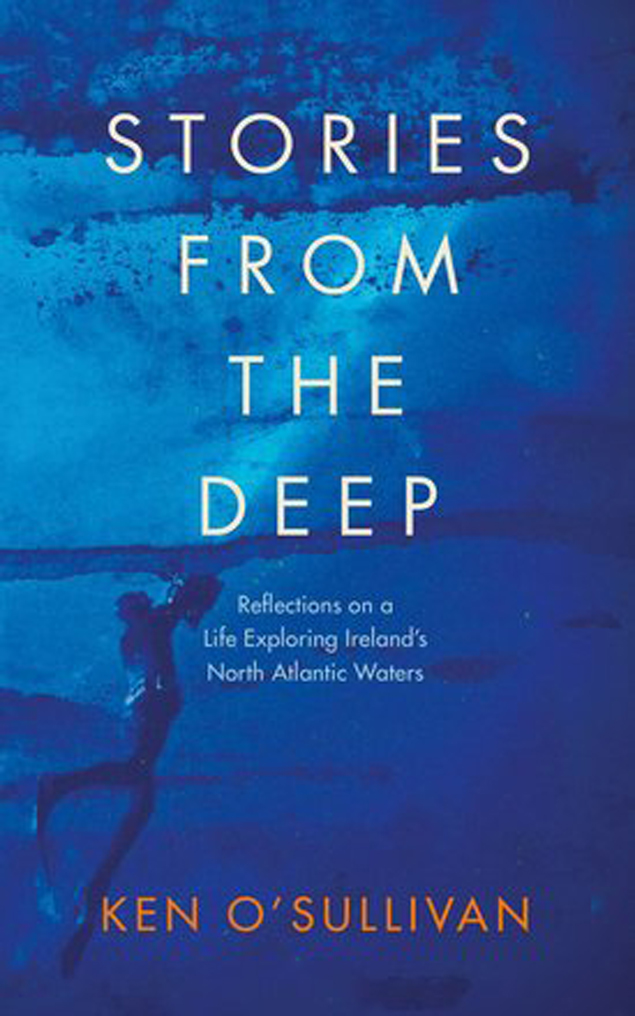 Sea Fever - the new book by Ken O'Sullivan
Sea Fever - the new book by Ken O'Sullivan
Surrounded by pin-striped suits, money and egos, he felt suffocated, longing for the wide-open spaces of home, but he persevered, believing doing something you loved for a living wasn’t realistic. Until one-day his heart suddenly over-ruled his head. He just couldn’t work anymore and packed it in. So began his journey back home to Ireland and the sea.
Making peace with his home-place, he swam every day and explored the undersea world around Ireland, discovering breathtakingly beautiful habitats and creatures. Teaching himself underwater photography, Ken dedicated himself to making documentaries about the sea and ocean conservation, he was reminded of the summers of his youth spent fishing, and of his ancestors who made a living that way before him - for life as a film-maker was often one of subsistence and self-dependence, but it was also one of great meaning and adventure, all of which is documented in Ken’s new book, Stories from the Deep.
From childhood summers spent on Fenit Island, to the years in New York and London longing for the ocean, and stories of chasing giant whales, waves and running from storms off Ireland’s west coast and around the world, Stories from the Deep is a captivating memoir that eloquently encapsulates a magical connection with the sea.
The book is available directly from Afloat here at €16.99 plus P&P
Coastwatch is appealing for volunteers over the Spring tide period to participate in its annual coastal survey which has been extended to October 21st writes Lorna Siggins
Recent stormy weather and heavy rain have curtailed this year’s effort, and Coastwatch coordinator Karin Dubsky said volunteers would be very welcome over the next week.
The island-wide Coastwatch shore survey is in its 32nd year, having been initiated by Ms Dubsky and former Irish Times environment editor Frank McDonald.
A cross-county border training and survey event takes place this Sunday on the Galway-Clare coast when 40-minute training will be followed by group surveying of three or more sites at the causeway to Aughinish island.
Soup is promised after the event from 11.30 am to 1 pm, and it will be led by Ms Dubsky, Dr Cillian Roden and Sabine Springer.
Ms Dubsky said it was hoped to identify traditional seaweed harvesting site, seagrass and small maerl beds, and unique marine limestone sculptures made by the sea.
She has recently described the decline of seagrass as “especially worrying”, especially in Dublin Bay, as it constitutes “the most important carbon sink in our marine areas”.
Participants in the Galway event on Sunday should bring boots and wind/shower proof clothes and a pen or biro and a camera and should register with regional co-ordinator Sabine Springer on tel 086 819 53 24 or mail [email protected].
Kayakers Invite Volunteers to Clean Up Liffey
A new clean-up initiative which involves volunteers kayaking down the river Liffey to pick up rubbish has been launched.
GreenKayak, a Danish non-governmental organisation founded in 2017 by Tobias Weber-Andersen, reports The Irish Times, operates a free service where volunteers sign up to kayak along the river in exchange for picking up litter.
The initiative launched its first Irish venture, in partnership with Dublin’s City Kayaking, on Tuesday. It aims to collect plastic from the river Liffey before it reaches the Irish Sea.
Each kayak is fitted with a bin and tools for grabbing plastic bobbing on the water’s surface. Each bin is weighed after docking, and the waste is recycled.
Volunteers must then share their experience on social media to promote the initiative, see related link.
Click here to read more on the background of this initiative
A group of Ireland’s environmental NGOs are teaming up this spring for a rather unique education project lead by the Irish Whale and Dolphin Group. The exciting Floating Classroom initiative is combining ocean exploration with an educational schools programme which aims to raise awareness of Ireland’s marine biodiversity. Taking to the seas in the IWDG’s research vessel Celtic Mist, the team of marine biologists and ocean literacy experts will be making their way down Ireland’s south-east coast from Arklow to Cork, calling into coastal communities providing engaging workshops to schools along the way.
After an extensive refit during the winter in Grand Canal Docks, Dublin, the 56-foot ketch yacht will also be open to the public when docked at local marinas and harbours, giving the public an opportunity to see the workings of a dedicated whale and dolphin research vessel and how researchers live and work at sea.
Apart from raising awareness for Ireland’s rich marine wildlife, the team will be emphasising the importance of taking care of our seas and oceans. With challenges such as plastics pollution, climate change and biodiversity loss now frequently in the news, there is a pressing need for communities to work together to tackle environmental issues.
While pupils will be introduced to the wealth of marine and coastal wildlife on their doorstep, each school will be asked to come up with three ways in which they feel they can make a difference for their local blue environment.
The team of biologists will also be proposing ways in which the public can get involved, including citizen science projects that encourage people to report their sightings of whales, dolphins, seabirds and even shark eggs! Schools will be encouraged to get involved in other community-based initiatives too, such as beach cleans being run by organisations in their area.
Environmental NGOs involved in the Floating Classroom include the Irish Whale and Dolphin Group, Marine Dimensions, the Irish Wildlife Trust and the Irish Ocean Literacy Network. Funding for the Floating Classroom has been kindly received by the Irish Environmental Network through their Capacity Building Grant.



























